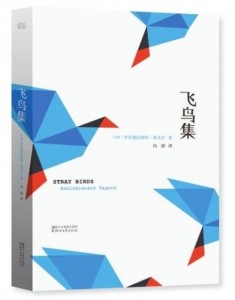January 5, 2016
Chinese translation of Indian poet draws criticism from state and scholars alike
by Chad Felix
A new edition of Nobel Prize-winner Rabindranath Tagore‘s Stray Birds has drawn controversy from multiple camps, reports Neil Connor at The Telegraph. Foremost amongst the critics is—perhaps not-so-surprisingly—the Chinese government, which has pulled copies of the title from bookstores.
As reported by Connor, in response to the government’s decision, Zheng Zhong, president of Zhejiang Literature and Arts Publishing House, the book’s publisher, told the Chinese state-run Global Times:
Readers and media have given us their benevolent feedback about the book, saying that the book contains inappropriate content that may mislead teenage readers. We accepted their suggestions and decided to recall the books.
The edition in question is translated by Chinese writer Zhang Haipeng, who writes under the pen name Feng Tang. Tang is also the author of a number of novels (Beijing, Beijing, Everything Grows, No Woman No Cry) that depict young people in Beijing. One of Tagore’s lines, as translated by Tang, reads: “The world unzipped its pants in front of his lover.”
The fact that a capital-s State opposes a line like the one above isn’t surprising (The Chinese media noted that the inclusion of such lewd images is “unwarranted”). It’s also not surprising to see a government using supposedly weak-minded, impressionable teenagers to justify censorship. (Won’t someone, please, think of the children?)
But China’s criticism of the work may be more nuanced than a concern for young eyes. The government could be involving itself in a much larger conversation about the role and responsibility of a translator to the original text and author of a work.
This is not a moot point, especially when one considers that Tagore’s own English translation of the same line reads: “The world puts off its mask of vastness to its lover.”
No unzipping there. Nope, note even close. Which may be why Tang is also receiving criticism from scholars.
Radha Chakravarty, a professor at the Ambedkar University in New Delhi, has his own questions. In AP’s The Big Story, he remarks:
This incident raises questions about the role of the translator in relation to the author and what his motives were. Was it about marketability? Was it to push its sales? Or was it an attempt at satire, at lampooning Tagore? It also raises questions about authorship authority and where does liberty end and where does license begin when we talk of creative freedom and creative expression.
Similarly, an editorial in the state-run People’s Daily Newspaper (via The Big Story) argues that Tang has failed in the translator’s role of remaining true to the text.
Seemingly undaunted, Tang, stands by his work, telling China’s The Paper that, “History and literature will make their judgments. Let time speak. Let the work itself speak.”
Chad Felix is the Manager of Direct Sales and Library Marketing at Melville House, and a former bookseller.
